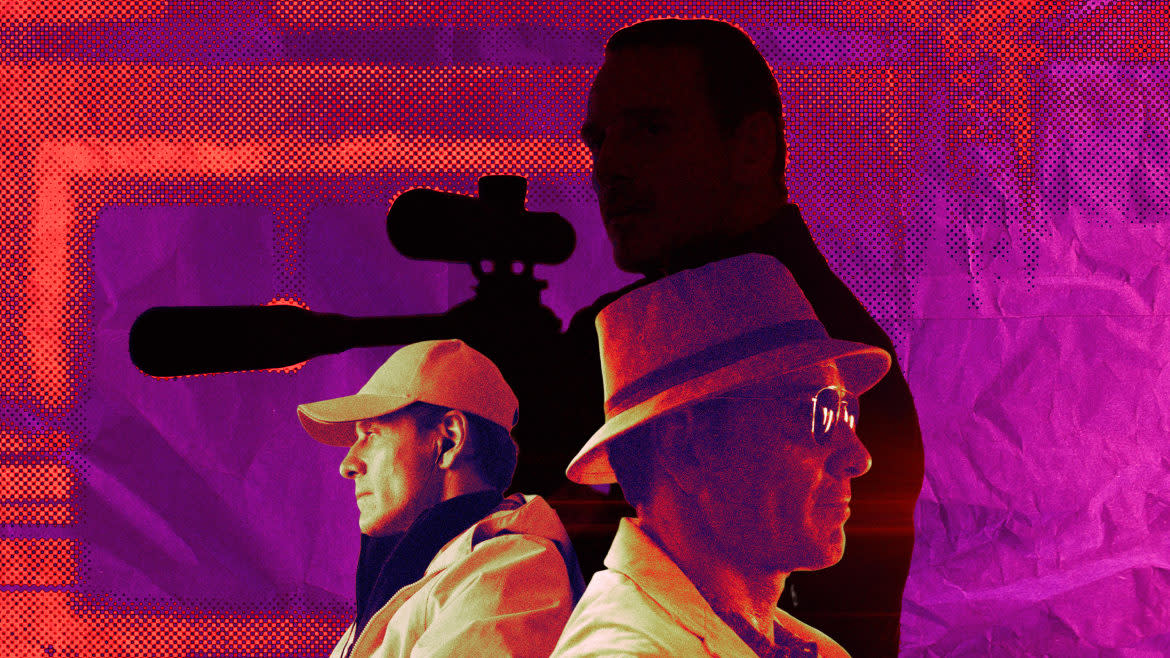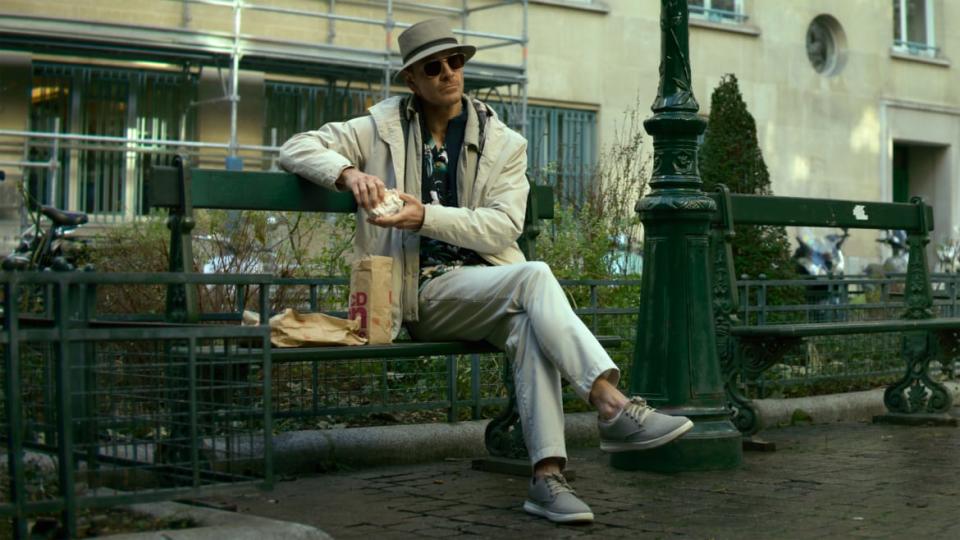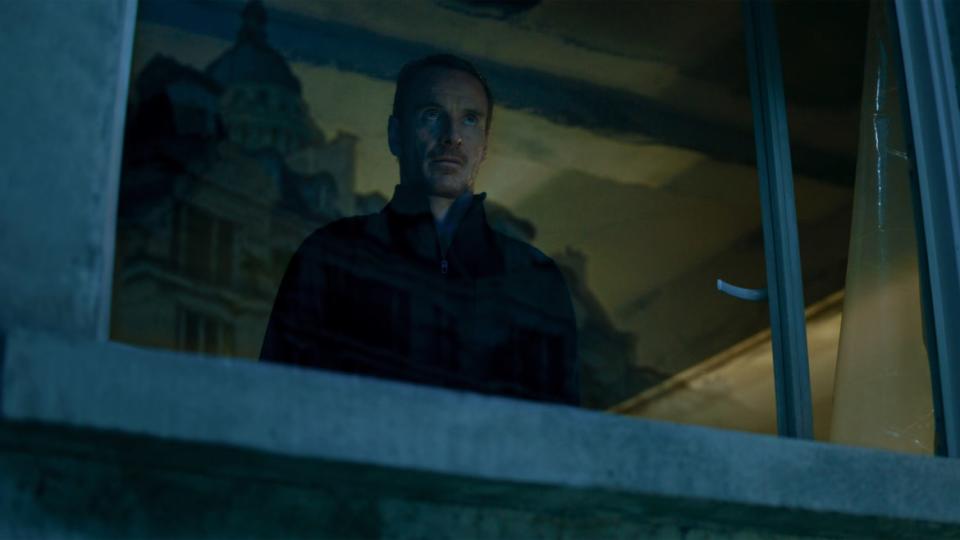‘The Killer’ Is David Fincher at His Wicked Best

From the mournful desolation of Alien 3 and Seven, to the satiric cynicism of Fight Club and epic futility of Zodiac, to the gnawing bitterness of The Social Network, The Girl with the Dragon Tattoo, and Gone Girl, David Fincher’s cinema has always had a noir heart. Thus, it’s natural that he fully embraces bleakness with The Killer, a hired-gun thriller (adapted from Alexis “Matz” Nolent and Luc Jacamon’s French graphic novel series) that lovingly channels one of the genre’s finest modern examples, Jean-Pierre Melville’s 1967 masterpiece Le Samouraï. The story of a cold, methodical assassin who’s driven by a strict code of conduct, and which is made with the exacting meticulousness that defines the director’s oeuvre, it’s arguably the greatest expression yet of Fincher’s style and worldview—caustic, unrelenting, and wickedly funny.
Like the illustrious Melville predecessor, Fincher’s The Killer (in theaters Oct. 27 and on Netflix Nov. 10) revolves around a homicidal professional (Michael Fassbender) who accepts the void at the center of the universe because he is one himself. A nameless specter in sunglasses and a tan hat and jacket, Fassbender’s protagonist is a figure of discipline, detachment, and rigorous ritual. As he says in the flat inner-monologue narration that functions as the vast majority of his dialogue, he’s a man who believes not in fate, karma, or God but, rather, in procedure, preparation, and attention to detail. Guided by a mantra that he repeats throughout the course of his story, he trusts no one, never improvises, and avoids empathy because it’s a weakness that begets vulnerability. “My process is purely logistical,” he intones, and the key to his success, as he so bluntly puts it, is that “I. Don’t. Give. A. Fuck.”
Fassbender is the ideal actor to inhabit this murderous cipher, radiating the sort of chillingly rational, ruthless emptiness that characterized his turns in Steve McQueen’s Shame as well as Ridley Scott’s Prometheus and Alien: Covenant. In the star’s hands, the killer is a machine who thrives by adhering to his ethos and its attendant routines. Quoting Popeye, he describes himself succinctly with, “I am what I am.” Fincher, however, knows that the lifeblood of noir is the tension—and, more often than not, doom—that comes from such an individual choosing to be who he’s not, or at least stepping outside his chosen path. Consequently, after opening scenes in which this agent of death articulates his core philosophy while waiting to slay a bigwig in a Parisian penthouse suite, Seven scribe Andrew Kevin Walker’s superbly concise script throws a wrench in his carefully laid out plans, courtesy of an unthinkable mistake: with his target in his sniper-rifle sights, Fassbender’s hit man misses his shot.
Once again partnering with cinematographer Erik Messerschmidt (Mank, Mindhunter), Fincher shoots his action with pinpoint precision, his camera movements scrupulous and his staging fastidious, with lens flares sharply splitting the frame and shadows and window fog tersely bifurcating Fassbender’s visage. Aesthetically, The Killer is as clean and efficient as its protagonist, and that form-content harmony extends to Trent Reznor and Atticus Ross’ electronic score of ominous tones and heartbeat thuds (which mirror the killer’s skill at lowering his pulse). Fincher’s clinical approach has no use for Melville’s forlorn romanticism, yet it fits the material like the gloves that Fassbender dons before getting down to his dirty business.

The Killer kicks into gear in the aftermath of its antihero’s unthinkable blunder. While his retreat is hasty, it’s nonetheless carried out with unruffled proficiency—just as, during this sequence, Fincher and Messerschmidt segue to more harried handheld camerawork that remains, at all times, adept and purposeful. Upon returning to his Dominican Republic hideout, Fassbender’s executioner discovers that he’s had advance visitors, and that they’ve done a number on his girlfriend Magdala (Sophie Charlotte). Though he preaches that indifference is necessary for triumph, he violates his own code and seeks out his handler Hodges (Top Gun: Maverick’s Charles Parnell), a New Orleans lawyer who he believes has information about the killers who were sent to kill him. When Hodges proves less than compliant, Fassbender’s character does what he does best in the first of many long-form sequences that place a premium on his expert step-by-step maneuvers, which are as neat-and-tidy as the storage units that house the tools of his trade, his crisply folded clothes and organized personal belongings, and the orderly means by which he cleans up his messes.
David Fincher’s ‘The Killer’: You’re Going to Want Michael Fassbender to Murder You
Split into chapters, The Killer follows the assassin to Florida, New York, and Chicago in search of vengeance, and at every stop along its journey, it exhibits Fincher’s mordant sense of humor. Fassbender’s deadpan narration is central to its wittiness, as is his character’s fondness for The Smiths (whose swooningly morose tracks are all over the soundtrack) and habit of using TV sitcom-inspired aliases (Sam Malone, George Jefferson, Archibald Bunker) for his myriad credit cards and plane tickets. The film’s drollness comes from its affected lack of affect, with Fassbender ruminating on random aspects of modern life (McDonalds, security cameras, Airbnb, WeWork) as an expression of not simply his perceptiveness and strategic acumen, but also his general anonymity. Never is that more apparent than early on, when he spouts a series of clichés—“dog eat dog,” “kill or be killed,” “survival of the fittest”—that speak to his deliberate and all-consuming blankness. With all due respect to Paul Verhoeven, he’s modern cinema’s true hollow man.

Fincher puts Fassbender’s mercenary through the paces, highlighted by a ferocious showdown with an ultra-violent brute (Sala Baker) that stands as one of 2023’s action standouts, and an ensuing whiskey-tasting meal with an adversary (Tilda Swinton) that’s the opposite of his prior clash—save, that is, for its conclusion. There’s no “there” to Fassbender’s killer, and certainly no remorse. The latter additionally goes for The Killer, which both thrills and amuses through its carefully calibrated rhythms and Fincher’s decidedly Melville-esque existentialism, in which systems—of thought and deed– are what provide safety, satisfaction and, fundamentally, a reason to exist.
If spiritually faithful to Le Samouraï for most of its fleet 118-minute runtime, however, the film discards noir’s trademark fatalism at its end, with Fincher’s protagonist making clear that “the only life path is the one behind you.” It’s a twist that transforms The Killer into its own uniquely sardonic beast—one in which survival isn’t earned by the fittest but, rather, by the truly soulless.
Get the Daily Beast's biggest scoops and scandals delivered right to your inbox. Sign up now.
Stay informed and gain unlimited access to the Daily Beast's unmatched reporting. Subscribe now.

 Yahoo News
Yahoo News 
